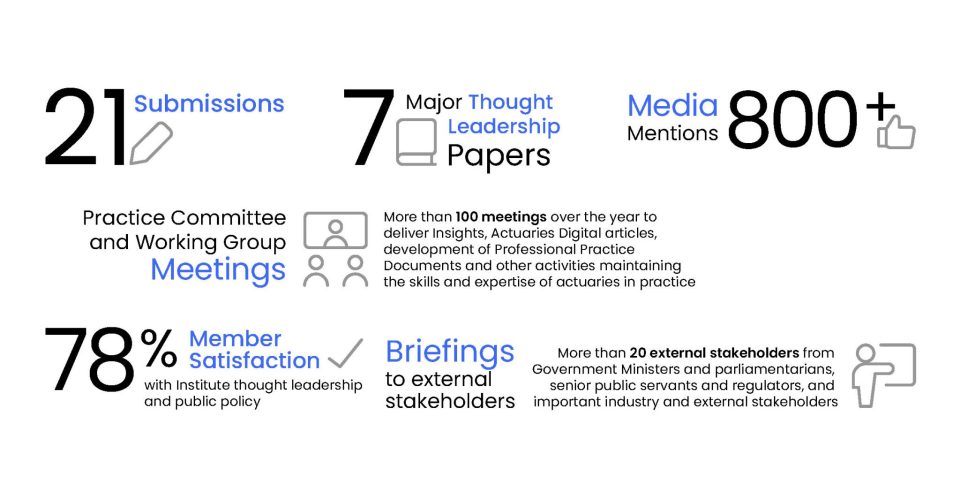
Catalyst for Change
Actuaries Institute 2023 Public Policy Year in Review.
Reflecting on 2023, the actuarial profession can take pride that yet again it has been at the heart of many important public policy debates this year: inequality; disability; insurance affordability and sustainability, especially in home insurance and disability income insurance; climate change and broader capital S sustainability issues; and reforming the retirement income system.
Thought Leadership Highlights for 2023

In May 2023, and just before Treasurer Jim Chalmers’ budget that started to articulate the Government’s thinking on “Measuring What Matters”, the Institute published “Not a Level Playing Field”. The Report highlights expanding income and wealth inequality leading to poorer outcomes across a range of areas of wellbeing for Australia’s low-income households, the interaction of socioeconomic drivers to those outcomes and policy options. It builds on the substantial research base published by the Institute to date which has largely focused on the intergenerational dimension of inequality.
In disability, the Institute made extensive contributions during the year, including a submission to the NDIS Review in May; a Dialogue Paper in September, “Providing Better Support for Children with Autism and Development Delay”; and a Report in October “Not a Level Playing Field – People with a Disability”, which examines more deeply factors impacting inequality for Australians with disability. It is especially exciting to see ideas in these publications being discussed and agreed to by Government Ministers. While the road ahead is long, there is positive momentum.
Two Reports released in August 2023 furthered insights into home insurance affordability. Across Australia, as at March 2023 nearly 1 in 8 households were experiencing insurance affordability stress, with this most acute for households in flood-prone locations. “Home Insurance Affordability Update” and “Funding for Flood Costs: Affordability, Availability and Public Policy Options” also include policy recommendations. The Institute welcomed the announcement later in the year by the NSW Government that it intends to reform the emergency services levy – as identified in the reports this is one of the most immediate steps that can be taken to alleviate affordability pressure.
Also in the area of insurance sustainability, the Disability Insurance Taskforce continued and “The Role of the Risk Function in Life Insurance Product Sustainability” was issued in May. We also hosted a roundtable on the use of genetic and genomic testing information in life insurance with consumer advocates, people with lived experience and health experts to share perspectives. This was an important first step to the Institute developing its position on the current consultation.
In the area of climate change and risk and broader sustainability, the Australian Actuaries Climate Index continues to provide objective evidence of the changing climate, with regional level insights available, and the submission to the Government’s proposed Sustainable Finance Strategy provides recommendations for helping Australia make an orderly and positive economic transition to net zero.
In the superannuation and retirement income space, the Institute continued having an active voice in numerous policy consultations and published “Retirement Matters“, which calls for the retirement income system to be reimagined given the concept of retirement has profoundly changed. The Paper provides excellent context for the bold proposals in the current Treasury consultation on superannuation in retirement.
The COVID-19 Mortality Working Group provided continuing and comprehensive coverage of excess mortality, including the July release of “How Mortality has affected mortality in 2020 to 2022”. The analysis provided valuable data for the health sector, social services and emergency services, as well as useful data to examine the effects of economic and social responses to the pandemic.
Other significant submissions to government and regulator consultations included Safe and Responsible AI in Australia and the National Stigma and Discrimination Strategy Review for mental health.
The Institute continued its coverage of the Federal Budget, delivering a pre-Budget submission in January and insights to members and media on the night.
The 2023 Young Actuaries’ Public Policy Essay Competition demonstrated how actuaries use data for good to solve challenges in a wide range of areas of the economy. Young Actuaries keen to further understand how they can contribute to public policy can watch this Insights Session from November 2023 to hear from peers who are helping in climate risk, superannuation, workers’ compensation and government schemes.
Stakeholder engagement
The influence of the profession is recognised across various practice areas. During the year, actuaries have met with Government Ministers and parliamentarians, senior public servants and regulators, and important industry and external stakeholders to share the insights from these publications and the broader practice excellence work done by the various committees and working groups. These collaborative discussions ensure that actuarial expertise plays a crucial role solving some of Australia’s most pressing societal problems.
Our active media management shows how far actuarial expertise reaches. In 2023, the Institute received more than 900 media mentions and this is an important channel to deliver policy recommendations and promote the actuarial brand. Increasingly, the Institute’s members are being sought for their views on various issues.
Council has approved new and improved governance materials covering the Institute’s public policy work which will modernise the principles and framework guiding these contributions. The process for reviewing these materials, conducted by Public Policy Council Committee and the Institute team, considered how the external environment has evolved with the Hayne Royal Commission, advances in technology and regulation and how the Institute’s capability has grown.
Closing out 2023
The Public Policy and Practice Excellence team thank the volunteers who commit to advancing the profession and influencing public policy – from Practice Committees and Working Groups, Thought Leadership authors and reviewers and the many others we engage.
We thank the members of the Public Policy Council Committee for their guidance and review and their considered suggestions to enhance the Papers and submissions.
We extend our gratitude to external stakeholders who contribute to our Thought Leadership direction and engagement with the profession to ensure that the Institute’s public policy work is well received.
We look forward to continuing to work together in 2024.
CPD: Actuaries Institute Members can claim two CPD points for every hour of reading articles on Actuaries Digital.







